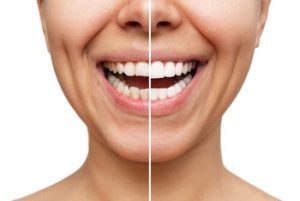Dental veneers have transformed countless smiles, providing a solution for everything from stained to uneven teeth. These thin layers, typically made of porcelain, are bonded to the front of the teeth, offering a natural appearance and enhancing an individual’s smile. Despite their popularity in cosmetic dentistry, many potential patients wonder, “Do veneers fall off?” This question merits a thorough exploration to understand the longevity and reliability of dental veneers.
What Are Dental Veneers?
Dental veneers, often porcelain veneers, are custom-made shells designed to cover the front surface of teeth. They are primarily used to improve the aesthetics of a smile, correcting issues like stained teeth, minor misalignments, and chips. Veneers are celebrated for their ability to give teeth a cleaner, more appealing smile.
The Lifespan of Dental Veneers
 The concern that veneers may fall off is not unfounded, but it is important to put it into perspective. Dental veneers are generally very durable. The most commonly used type of porcelain veneers can last 10 to 15 years with proper care. The longevity of veneers depends on several factors, including the type of veneer, the quality of the bonding agent, the precision of the application, and the patient’s oral hygiene habits.
The concern that veneers may fall off is not unfounded, but it is important to put it into perspective. Dental veneers are generally very durable. The most commonly used type of porcelain veneers can last 10 to 15 years with proper care. The longevity of veneers depends on several factors, including the type of veneer, the quality of the bonding agent, the precision of the application, and the patient’s oral hygiene habits.
Why Would Veneers Fall Off?
Understanding why dental veneers might fall off is crucial for anyone considering this form of cosmetic dentistry. Despite the advanced technology and techniques used in their application, there are several reasons why even the best-applied veneers might need help with issues. These challenges can often be mitigated through appropriate dental care and lifestyle adjustments.
Improper Bonding Techniques
The most technical reason veneers fall off is improper bonding. This process requires precise preparation of the tooth surface, where the tooth enamel is etched to allow a strong bond between the dental veneer and the tooth. The veneers may fall if this process is not done correctly, the bonding agent is not compatible, or the bonding is of poor quality. Regular dental appointments help ensure the bonding remains secure over time.
Underlying Tooth Decay
Tooth decay is a significant threat to the stability of dental veneers. Decay can undermine the natural tooth’s structure, leading to a weaker foundation for the veneer. Proper oral hygiene is crucial to prevent decay and maintain the integrity of natural teeth and veneers. Brushing twice a day and using fluoride toothpaste can significantly mitigate this risk.
Impact of Gum Disease
Gum disease, another result of poor dental hygiene, can cause the gums to recede. Recession can expose the bases of the veneers, creating an unstable environment that may lead to veneers becoming loose or falling off. Regular brushing, flossing, and antibacterial mouthwash are essential to maintain gum health.
Physical Stress from Teeth Grinding
Teeth grinding, or bruxism exerts tremendous pressure on teeth and, by extension, on veneers. This repeated stress can cause porcelain veneers to crack, chip, or detach from the tooth surface. Addressing teeth grinding with interventions such as wearing a night guard can protect veneers from physical stresses.
Eating Hard or Sticky Foods
Eating habits, particularly consuming hard or sticky foods, can directly impact the longevity of veneers. Biting into hard foods like candies or ice can cause veneers to crack or chip, while sticky foods can pull at the veneers, potentially causing them to detach from the tooth’s surface. Being mindful of food choices is a straightforward way to avoid causing damage to veneers.
Trauma to the Face
Any facial trauma, such as an accident or sports injury, can cause immediate and visible damage to veneers. Wearing protective gear during high-risk activities and being cautious during physical activities can help prevent such incidents.
Inadequate Dental Treatments
Sometimes, the initial placement of the veneers may not have been performed optimally. Choosing the right dental clinic and dentist who is an expert in cosmetic dentistry and has a proven track record with dental veneers is crucial. Ensuring that experienced professionals carry out your dental treatments can dramatically decrease the likelihood of veneer failure.
Natural Wear and Tear
Even with the best care, dental veneers are not immune to the natural wear and tear that affects all dental work. Porcelain veneers, while durable, may eventually wear down or become damaged over time due to normal chewing and biting actions. Regular check-ups can help identify and address wear and tear before it causes the veneers to fall off.
Poor Initial Tooth Condition
 Suppose previous dental issues, such as large fillings or previous decay, significantly weaken the teeth receiving veneers. In that case, they might not provide a stable enough base for the veneers. In such cases, other dental treatments may be necessary before veneers can be successfully applied.
Suppose previous dental issues, such as large fillings or previous decay, significantly weaken the teeth receiving veneers. In that case, they might not provide a stable enough base for the veneers. In such cases, other dental treatments may be necessary before veneers can be successfully applied.
Understanding these potential issues can help those with or considering veneers to take proactive steps to maintain them. Regular dental check-ups, maintaining excellent oral hygiene, managing conditions like teeth grinding, and being cautious with dietary choices are all critical in preventing veneers from falling off. If you’re experiencing issues with your veneers or are considering getting them, it’s advisable to consult with a dental professional at a reputable dental clinic. This ensures that any interventions are necessary and effectively executed to maintain your oral health and the beauty of your smile.
How to Prevent Veneers from Falling Off
When considering the addition of dental veneers to enhance your smile, consider not only the immediate aesthetic benefit but also the long-term care and maintenance to prevent issues such as damaged veneers or even veneers that might fall off. Ensuring the longevity of your veneers involves a combination of proper oral hygiene, regular dental appointments, and mindful habits. Here are detailed strategies to keep your veneers pristine and prevent potential problems.
Maintain Excellent Oral Hygiene
The cornerstone of keeping your dental veneers secure is maintaining stellar oral hygiene. This involves more than just avoiding cavities; it extends to caring for your gum health and ensuring the base—your natural teeth—remains healthy and strong. Here’s how to ensure your oral hygiene supports the longevity of your veneers:
- Brush and floss twice a day: Using a soft-bristled toothbrush and non-abrasive toothpaste. It is critical to floss everyday to eliminate plaque between the teeth and along the gum line, which is where gum disease begins.
Use Antiseptic Mouthwash: Including an antiseptic mouthwash in your daily regimen will help minimise bacterial load in the mouth, preventing against gum disease and maintaining a clean environment for your veneers.
Schedule Regular Dental Appointments
Regular dental appointments are vital for routine cleaning and early detection of any issues that could lead to your veneers falling off. During these visits, your dentist can spot signs of gum disease, decay, or loosening of the veneer. Here’s what to expect:
- Professional Cleaning: This helps remove tartar that can’t be eliminated by brushing and flossing alone, which can lead to gum disease. If left unchecked
- Inspection of Veneers: Your dentist will check for signs of wear or damage, such as small cracks or chips, and can make repairs before major problems occur.
Address Teeth Grinding
Grinding your teeth, known as bruxism, can exert excessive force on veneers, leading to potential cracks or causing the veneers to loosen. Managing this condition is crucial:
- Wear a Mouth Guard: A custom-fitted mouth guard can be worn during sleep to protect natural teeth and veneers from the pressure and abrasion caused by grinding.
- Stress Reduction Techniques: Since stress is a common cause of teeth grinding, techniques such as meditation, counselling, and exercise can reduce the frequency and intensity of grinding.
Avoid Hard and Sticky Foods
Diet plays a significant role in the health of your veneers. Hard and sticky foods can damage veneers by causing them to crack or become loose.
- Hard Foods: Foods like ice, hard candies, and nuts should be consumed cautiously or avoided.
- Sticky Foods: Sticky candies or snacks can pull at the veneer, potentially causing it to detach from the tooth surface.
Use Dental Wax for Temporary Protection
If you notice a rough edge on a veneer or if a veneer becomes slightly loose, applying dental wax can provide temporary protection. This can prevent further damage until you can see your dentist. Dental wax can cover sharp edges and hold the veneer in place, preventing irritation to your tongue and tissues.
Protect Against Dental Trauma
Protecting your mouth from physical trauma is important, especially if you engage in sports or physical activities where your face might be at risk.
- Wear a Mouthguard: Always use a sports guard when participating in sports to shield your veneers from impact.
- Be Mindful of Physical Activities: Non-contact activities can pose risks if they involve sudden movements or potential impacts.
Properly Align Uneven Teeth Before Veneer Application
Suppose you have uneven teeth; address them with orthodontic treatment before applying veneers. Proper alignment ensures the veneers can be placed more securely, reducing the risk of uneven wear and potential loosening.
Monitor and Maintain Overall Health
General health conditions such as diabetes or conditions that cause dry mouth can affect oral health and, subsequently, the integrity of your veneers. Maintaining overall health and managing these conditions is essential in ensuring optimal dental health.
Educate Yourself on Dental Treatments
Understanding the procedures and materials involved in your dental care can empower you to make informed decisions about treatments and maintenance. Asking your dentist detailed questions about the types of veneers, the bonding process, and what materials are used can help you better understand how to care for them.
Choose the Right Dental Clinic
 Finally, the choice of dental clinic and the expertise of the cosmetic dentist are crucial in ensuring that your veneers are applied correctly and with the highest standards. Look for a clinic expert in cosmetic dentistry with a track record of success with dental veneers.
Finally, the choice of dental clinic and the expertise of the cosmetic dentist are crucial in ensuring that your veneers are applied correctly and with the highest standards. Look for a clinic expert in cosmetic dentistry with a track record of success with dental veneers.
By following these comprehensive steps, you can significantly reduce the risk of your veneers falling off and ensure that your investment in your smile is long-lasting. Regular dental check-ups, proper hygiene practices, and protective measures all play a role in the durability and appearance of your veneers.
Cosmetic Dentistry at Beyond Infinity Dental
Choosing the right dental clinic and an experienced cosmetic dentist is crucial for the success of your dental veneers. At Beyond Infinity Dental, our expertise in cosmetic dentistry ensures that your veneers are applied with precision and care, significantly reducing the risk of problems like veneers falling off.
While dental veneers can fall off, this is rare when they are correctly applied and cared for. By understanding the causes and taking preventative measures, you can enjoy a beautiful, durable smile for years.
If you’re considering veneers or need an expert consultation about your existing veneers, don’t hesitate to contact Beyond Infinity Dental at (02) 8806 3799. Our team is ready to help you achieve and maintain that perfect smile!
References:
https://www.colgate.com/en-us/oral-health/veneers/how-long-do-veneers-last#:~:text=According%20to%20the%20American%20Dental,provides%20excellent%20esthetics%20and%20longevity.
https://biomedgrid.com/pdf/AJBSR.MS.ID.000584.pdf









